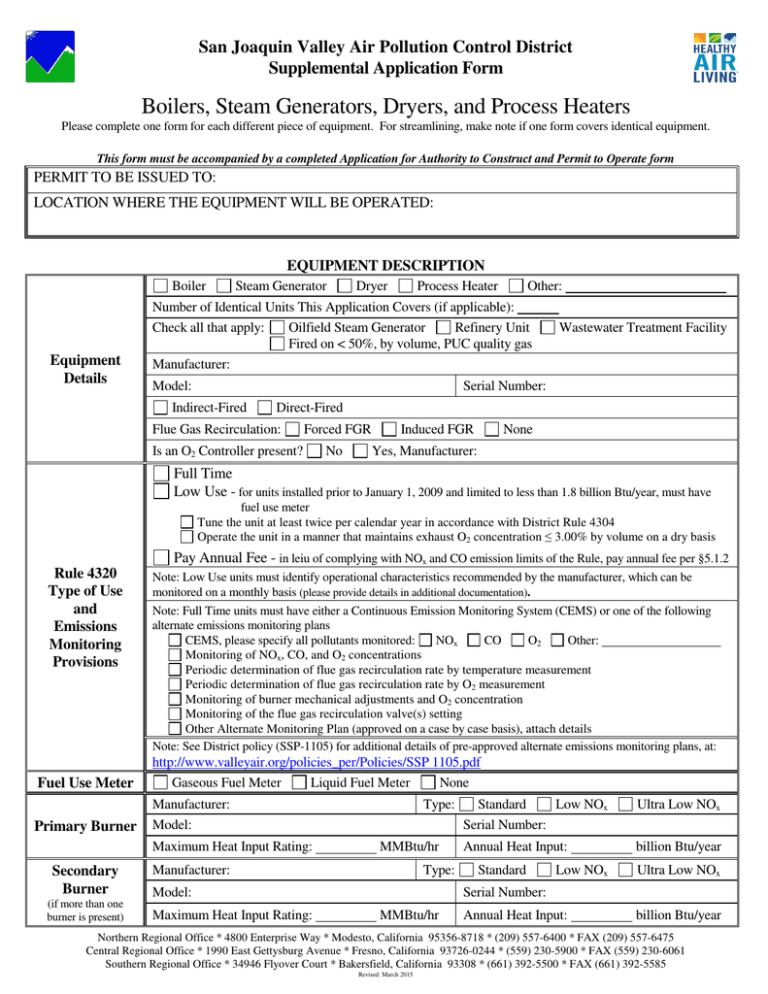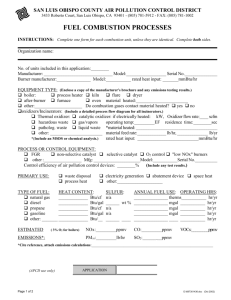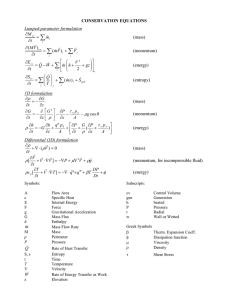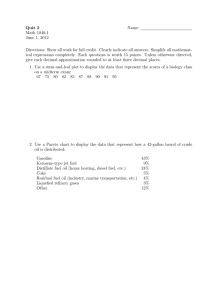Boilers, Steam Generators, Dryers, and Process Heaters
advertisement

San Joaquin Valley Air Pollution Control District Supplemental Application Form Boilers, Steam Generators, Dryers, and Process Heaters Please complete one form for each different piece of equipment. For streamlining, make note if one form covers identical equipment. This form must be accompanied by a completed Application for Authority to Construct and Permit to Operate form PERMIT TO BE ISSUED TO: LOCATION WHERE THE EQUIPMENT WILL BE OPERATED: EQUIPMENT DESCRIPTION Boiler Equipment Details Steam Generator Dryer Process Heater Other: Number of Identical Units This Application Covers (if applicable): Check all that apply: Oilfield Steam Generator Refinery Unit Fired on < 50%, by volume, PUC quality gas Manufacturer: Model: Wastewater Treatment Facility Serial Number: Indirect-Fired Direct-Fired Flue Gas Recirculation: Forced FGR Is an O2 Controller present? No Induced FGR None Yes, Manufacturer: Full Time Low Use - for units installed prior to January 1, 2009 and limited to less than 1.8 billion Btu/year, must have fuel use meter Tune the unit at least twice per calendar year in accordance with District Rule 4304 Operate the unit in a manner that maintains exhaust O2 concentration ≤ 3.00% by volume on a dry basis Pay Annual Fee - in leiu of complying with NOx and CO emission limits of the Rule, pay annual fee per §5.1.2 Rule 4320 Type of Use and Emissions Monitoring Provisions Note: Low Use units must identify operational characteristics recommended by the manufacturer, which can be monitored on a monthly basis (please provide details in additional documentation). Note: Full Time units must have either a Continuous Emission Monitoring System (CEMS) or one of the following alternate emissions monitoring plans CEMS, please specify all pollutants monitored: NOx CO O2 Other: Monitoring of NOx, CO, and O2 concentrations Periodic determination of flue gas recirculation rate by temperature measurement Periodic determination of flue gas recirculation rate by O2 measurement Monitoring of burner mechanical adjustments and O2 concentration Monitoring of the flue gas recirculation valve(s) setting Other Alternate Monitoring Plan (approved on a case by case basis), attach details Note: See District policy (SSP-1105) for additional details of pre-approved alternate emissions monitoring plans, at: Fuel Use Meter http://www.valleyair.org/policies_per/Policies/SSP 1105.pdf Gaseous Fuel Meter Liquid Fuel Meter None Primary Burner Manufacturer: Model: Maximum Heat Input Rating: Secondary Burner (if more than one burner is present) Type: MMBtu/hr Manufacturer: Type: Model: Maximum Heat Input Rating: Standard Low NOx Serial Number: Ultra Low NOx Annual Heat Input: billion Btu/year Standard Low NOx Ultra Low NOx Serial Number: MMBtu/hr Annual Heat Input: billion Btu/year Northern Regional Office * 4800 Enterprise Way * Modesto, California 95356-8718 * (209) 557-6400 * FAX (209) 557-6475 Central Regional Office * 1990 East Gettysburg Avenue * Fresno, California 93726-0244 * (559) 230-5900 * FAX (559) 230-6061 Southern Regional Office * 34946 Flyover Court * Bakersfield, California 93308 * (661) 392-5500 * FAX (661) 392-5585 Revised: March 2015 EMISSIONS DATA Note: See District BACT and District Rule 4320 requirements for applicability to proposed unit at http://www.valleyair.org/busind/pto/bact/chapter1.pdf, and http://www.valleyair.org/rules/currntrules/r4320.pdf, Primary Fuel Fuel Type: Natural Gas LPG/Propane Higher Heating Value: Diesel Btu/gal or Other: Btu/scf Sulfur Content: Start-up Steady State Operational Mode (ppmv) % by weight or (lb/MMBtu) (ppmv) gr/scf Shutdown (lb/hr) (ppmv) (lb/hr) Nitrogen Oxides Primary Fuel Emissions Data Carbon Monoxide Volatile Organic Compounds Duration (please provide justification) hr/day % O2, dry basis, if corrected to other than 3%: Fuel Type: Secondary Fuel Natural Gas Diesel Btu/gal or hr/yr Other: Btu/scf How will the secondary fuel be used? Secondary full-time fuel Backup for primary fuel Sulfur Content: (ppmv) % by weight or gr/scf Other: Steady State Operational Mode hr/day % LPG/Propane Higher Heating Value: hr/yr Start-up (lb/MMBtu) (ppmv) Shutdown (lb/hr) (ppmv) (lb/hr) Nitrogen Oxides Secondary Fuel Emissions Data Carbon Monoxide Volatile Organic Compounds Duration (please provide justification) hr/day % O2, dry basis, if corrected to other than 3%: Source of Data Additional Emissions Control Equipment Manufacturer’s Specifications hr/day hr/yr % Emission Source Test Other Selective Catalytic Reduction - Manufacturer: Ammonia (NH3) Urea Other: (please provide copies) Model: Non-Selective Catalytic Reduction - Manufacturer: Control Efficiencies: NOx hr/yr %, SOx Model: %, PM10 %, CO %, VOC % Other (please specify): HEALTH RISK ASSESSMENT DATA Note: See Manufacturer’s Specifications for Stack Parameters and Exhaust Data. All information is required. Operating Hours Maximum Operating Schedule: Receptor Data Stack Parameters Exhaust Data Distance to nearest Residence Direction to nearest Residence Distance to nearest Business Direction to nearest Business hours per day, and Distance is measured from the proposed stack location to the nearest boundary of the nearest apartment, house, dormitory, etc. feet Direction from the stack to the receptor, i.e. Northeast or South. Distance is measured from the proposed stack location to the nearest boundary of the nearest office building, factory, store, etc. feet Direction from the stack to the receptor, i.e. North or Southwest. Release Height feet above grade Stack Diameter inches at point of release Rain Cap Flapper-type Direction of Flow Vertically Upward Flowrate: hours per year acfm Urban (area of dense population) Fixed-type None Horizontal Temperature: Other: Other: ° from vert. or ° from horiz. °F Rural (area of sparse population) Facility Location Include a facility plot plan showing the location of the stack. Please indicate North on the plot plan. For public notice projects, indicate on plot plan the facility boundaries or fence line and distance(s) from stack to boundaries.



